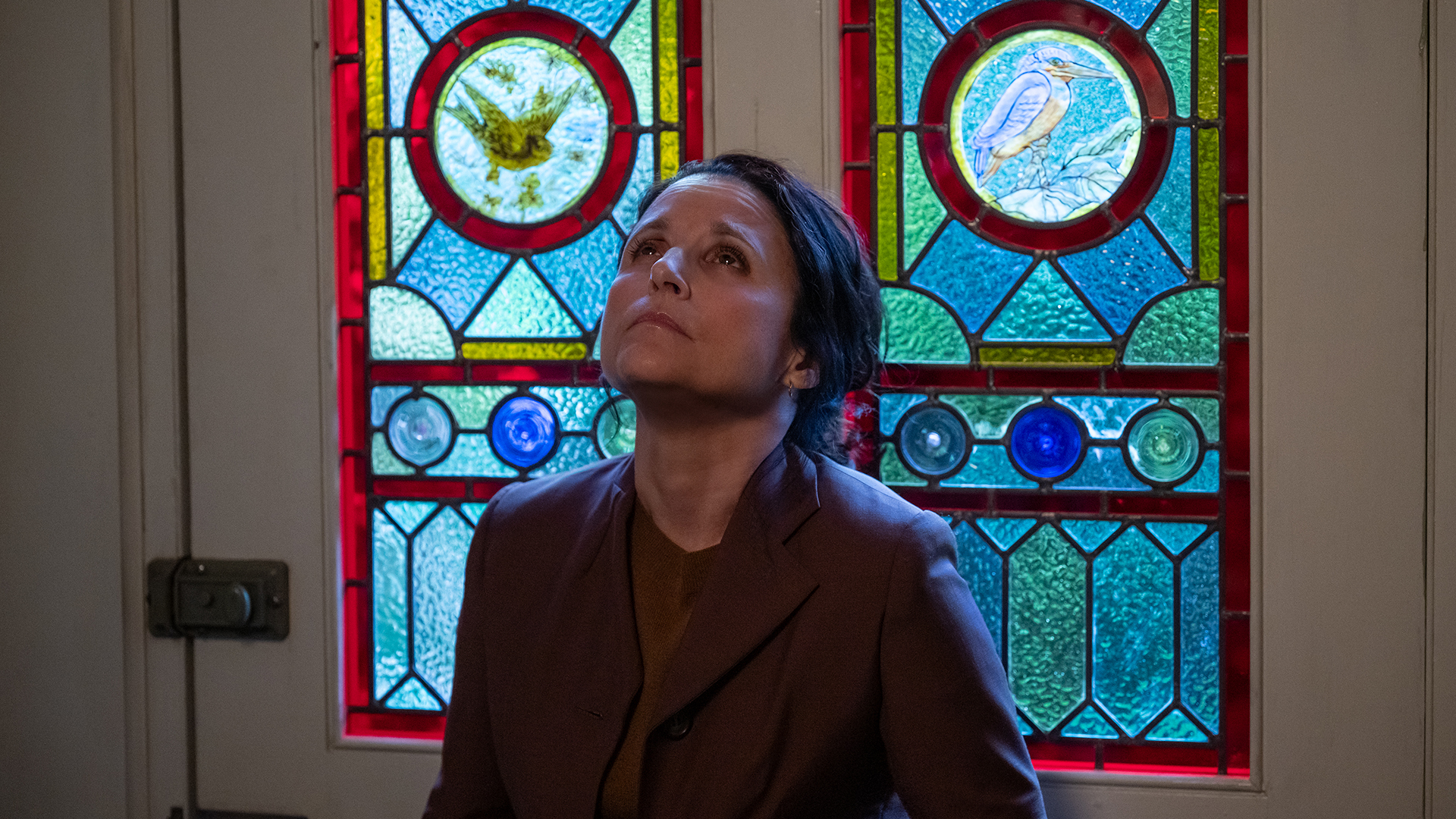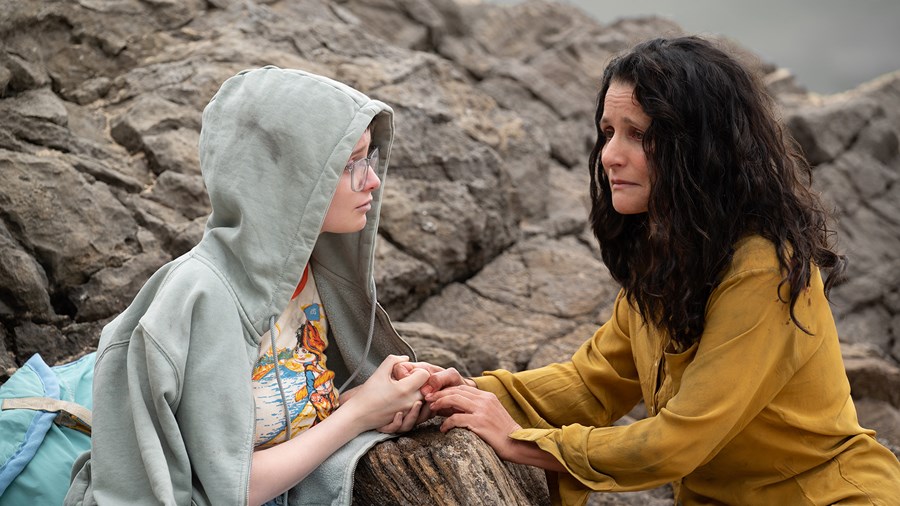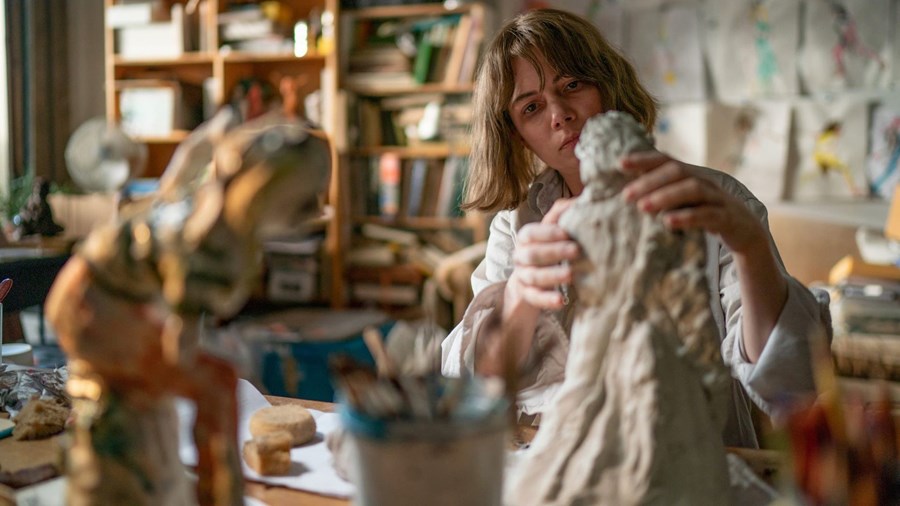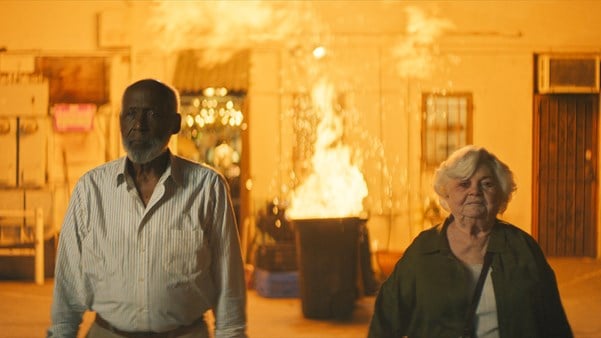Grief is the thing with feathers in director Daina O Pusić’s fantastical drama, wherein a macaw takes the form of Death and interacts with a terminally ill teenager. Here, Lillian Crawford explores the meaning of winged messengers in literature and cinema, from Homer’s eagle to Kelly Reichardt’s pigeon.

We meet Zora, played by Julia Louis-Dreyfus, at a taxidermist’s shop, where she moves one of the stuffed animals on display. ‘Please don’t touch the clients,’ barks the owner, before she steps forward with an ensemble of rats dressed in Catholic garb. Zora haggles, securing a better offer with an appeal to the heart by telling the shopkeeper that her teenage daughter loves them. ‘Won’t she miss them?’ he asks.
Tuesday, the feature directorial debut of Daina O Pusić, seems a typical mother-daughter drama. Zora is a mother shirking her professional duties at the distress of having a terminally ill daughter called Tuesday, played by Lola Pettigrew. Yet from the offset, something feels surreal, almost magic-realist about Zora’s life. Taxidermy itself has gothic associations, calling forth the uncanny quality of a creature that has retained its corporeal form after death. Think of Norman Bates and his penchant for stuffed birds in Alfred Hitchcock’s Psycho (1960), or the trophy heads decking the timber walls of many a cinematic cabin in the woods.

A taxidermy mount is not necessarily sinister, however, and might be a source of inspiration. The first thing we discover about Tuesday before we see her onscreen is that she loves these peculiar Papal rat conspirators, with Zora bringing them to life on the shop counter in a clearly well-rehearsed scene. It brings to mind Julian Barnes’ 1984 novel Flaubert’s Parrot, which recalls the story of French author Gustave Flaubert taking inspiration from a stuffed parrot that sat atop his writing desk when he wrote ‘A Simple Heart’. In that story, when a servant girl called Félicité dies, the great love she holds deifies her pet parrot, which floats above her deathbed.
It is a remarkably similar narrative to Tuesday, the eponymous girl seeming to have achieved no great feats in her short life, and yet her innocence and sensibility is projected onto a macaw that takes on a deific persona of Death. The sometimes giant, sometimes tiny bird is first introduced in a strange, hallucinogenic sequence in which it appears before an Indian woman, who is frightened to see this colourful harbinger. Indeed, in some Indian states, parrots and parakeets are trained as fortune tellers, capable of turning over tarot-like cards for strangers to predict their fate. Each time the macaw presents itself to someone in Tuesday, they seem to immediately recognise him, and his unpleasant task.

Tuesday (2023)
Traditions of reading birds have an ancient history, known as ornithomancy or augury, developed from the Hittites in Anatolia through rich traditions in Rome and Greece. Early in Homer’s Odyssey, when Telemachus is attempting to convince the people of Ithaca that his father Odysseus may yet return home, an eagle appears three times, flying to the right, with a dead dove in its talons. It forebodes the eventual coming of Odysseus to brutally murder the suitors of his wife Penelope, who have taken over his house. Still today, superstitions around birds are commonplace, most typically in the folkloric tradition of counting magpies to determine whether one will have good or bad luck: ‘One for sorrow, two for joy…’
When the macaw appears to Tuesday, it is clear that she is very unwell. Yet as soon as he does so, her breathing tube disappears and she is able to speak clearly – once the bird is present, the drama enters a sort of dreamtime. Tuesday communicates with Death, who speaks with a resonant growl courtesy of Arinzé Kene, and shares with him her love of rap. The macaw is dishevelled and blackened with soot and grime, which Tuesday washes off and gives her omen a much brighter appearance. The interaction they have is bizarre, moving from acceptance of what must come, to denial, even violence. ‘Please don’t kill me,’ Tuesday begs. ‘I must,’ responds Death. ‘Can I at least phone my mum?’

Tuesday (2023)
The exchange is reminiscent of that between the speaker and the titular bird in Edgar Allan Poe’s 1845 poem ‘The Raven’, as a man laments the loss of his love, Lenore. The raven sits atop a bust of Pallas Athena, guide to Odysseus on his return to Ithaca, and the goddess of wisdom herself represented by the owl. Towards the end, the speaker asks if there is a Heaven and if he might, ‘“Clasp a rare and radiant maiden whom the angels name Lenore.”/Quoth the Raven “Nevermore.”’
At the end of Tuesday, after her daughter has died, Zora asks Death if there is an afterlife where she might greet her again. No, he responds, only in the echoes of what has come before, and he perfectly imitates the final conversation Zora had with Tuesday, in which she promised to keep going after her daughter was gone. The sentiment captures the essence of ‘The Raven’, the acceptance of grief and the inability for new reason to come from the bird, only repetitions of the past.

Showing Up (2022)
The macaw as a symbol of death also evokes Gabriel García Márquez’s 1985 novel Love in the Time of Cholera, in which Dr Juvenal Urbino dies after reaching for his pet parrot in a mango tree. Similarly, birds have represented limited freedom in a range of films, from working-class Billy Casper’s kestrel in Ken Loach’s Kes (1969) to sculptor Lizzy’s rescued pigeon in Kelly Reichardt’s Showing Up (2022). Tuesday bears resemblance to the 2020 Australian film Penguin Bloom, in which a woman (played by Naomi Watts) is wheelchair-bound after an accident, and her road to recovery is paralleled by that of an injured magpie.
There is no recovery for Tuesday, but when the macaw flies off at the end of the film, there is a sense of hope left for Zora. Tuesday also draws from Lewis Carroll’s Alice books, with the sense that these characters have fallen down an illusory rabbit hole. At one point, Zora grows to a great height, and then shrinks in an ‘Eat Me/Drink Me’ fashion, representing the topsy-turvy feelings she and her daughter are experiencing at the end of Tuesday’s short life. Grief is not something that can be processed through the lens of reality, and it makes sense that Pusić pulls from a range of surreal sources to tell this story. Just as there is no reasoning with a macaw in its imitative speech, so too is there no reasoning with Death.
WATCH TUESDAY IN CINEMAS




